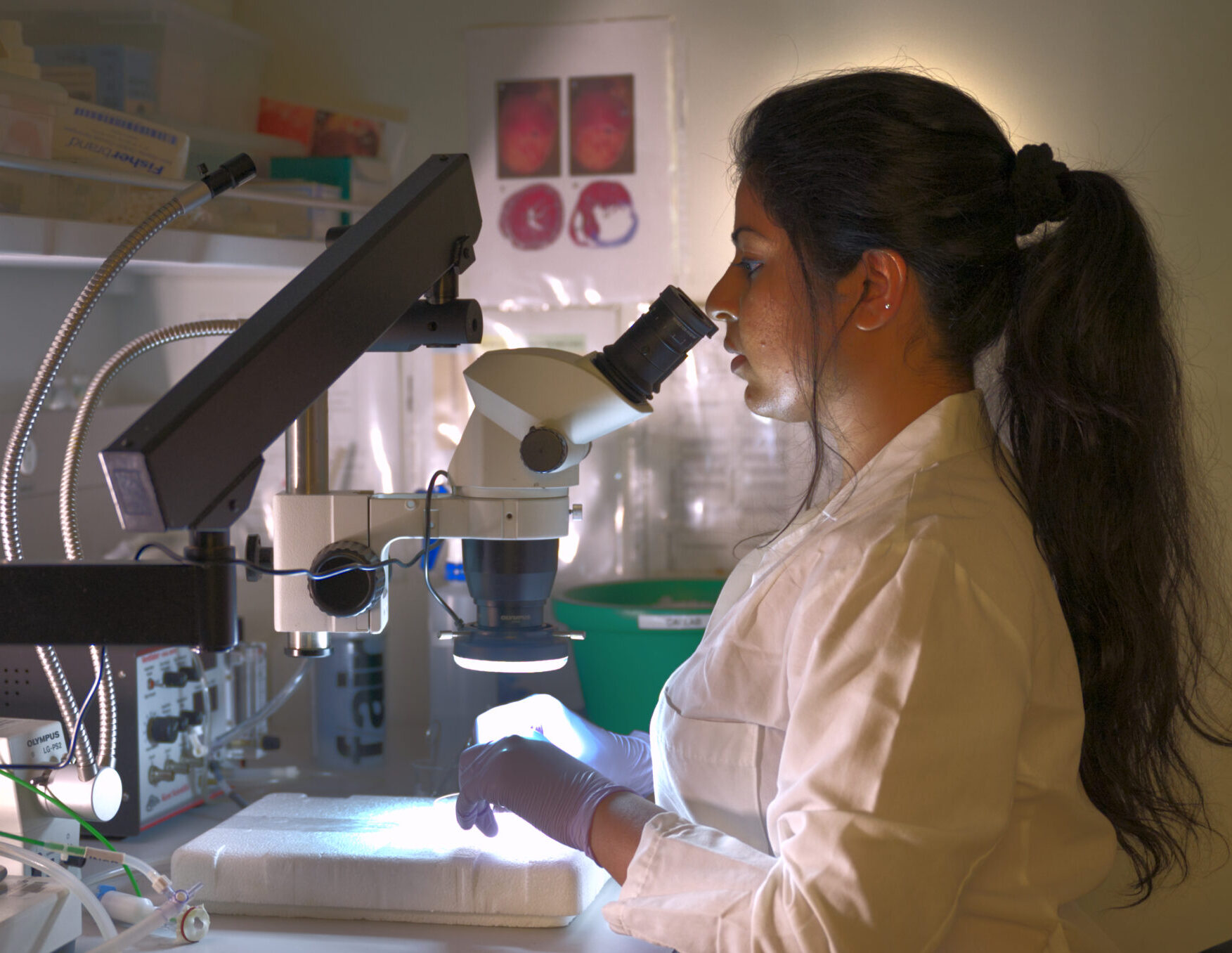July 2025

Karen “Kya” Sverdrup, PhD, a researcher at the Norwegian National Centre for Ageing and Health, is a visiting scholar in Dr. Kushang Patel’s Pain, Aging, and Physical Activity Lab. Dr. Sverdrup’s research focuses on device-measured physical activity in older adults and individuals with pre-dementia syndromes and dementia. She joined the Patel Lab in January 2025 to further her expertise in the epidemiology of pain, implementation and intervention research, and non-pharmacologic treatments aimed at improving pain management in older adults.
Dr. Sverdrup earned a Bachelor of Science in Physical Therapy from Oslo Metropolitan University in 2011, followed by a Master’s in Applied Social Sciences, International Social Welfare and Health Policy in 2016. In 2022, she completed her PhD at the University of Oslo.
Dr. Sverdrup’s long-term research goal is to promote health equity for older adults and enhance our understanding of healthy aging through population-based research. She aims to influence policy development and guide interventions that improve health outcomes. Her career aspirations include building a robust and diverse research portfolio, securing grants, leading innovative projects, and fostering interdisciplinary collaborations. She values working in dynamic, collaborative environments that challenge her and offer meaningful responsibilities.
What Dr. Sverdrup enjoys most about working at APM is its inclusive and collaborative community. She has appreciated learning about the various projects underway in the Patel Lab and finds inspiration in the team’s dedication to advancing research in the field. And yes—she’s also a fan of the stunning views from the 14th-floor office!
Outside of work, Dr. Sverdrup loves traveling and spending time outdoors—hiking, biking, skiing, and snorkeling/diving with friends. When the weather turns, she enjoys knitting, practicing yoga, and embracing the invigorating contrast of a hot sauna followed by a cold plunge in natural waters. So far, Seattle and its surroundings have exceeded her expectations, and she’s excited for the adventures and opportunities the summer season will bring.
March 2025
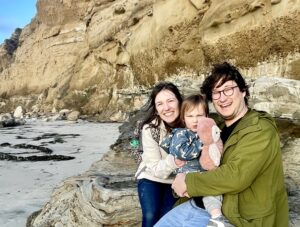
Jacob Gross, MD MPH is an Assistant Professor in the Department of Anesthesiology & Pain Medicine and Director of UW TelePain. Dr. Gross attended The University of Michigan for his undergraduate degree, followed by medical school at the University of Texas Medical School at Houston, his hometown. During his medical school training he also obtained a Master of Public Health with a focus on Healthcare Policy. He completed anesthesia residency and Pain fellowship here at the University of Washington. His training experience at UW inspired him to return as faculty to collaborate with talented colleagues, teach, and engage in unique opportunities in the Pacific Northwest.
His current research interests focus on expanding access to high-quality pain management through novel clinic models, provider education, and technology. As Director of UW TelePain and the Pain and Opioid Consult Hotline he leads weekly didactic sessions open to all community providers to improve their knowledge and confidence in treating complex chronic pain. Dr. Gross and the TelePain team are recent recipients of a Health Resources and Services Administration (HRSA) Technology-Enabled Collaborative Learning Program grant to facilitate the expansion of the UW TelePain program. The focus of this five-year award involves expanding UW TelePain further into the WWAMI region connecting pain specialists with primary care providers in rural, frontier, tribal and underserved areas improving access to specialty pain care.
Dr. Gross’ long-term goal is to reimagine the fundamentals of pain medicine practice and education by developing alternative clinical models that integrate interdisciplinary approaches to pain care with cutting edge treatments and technologies. He hopes to expand the TelePain program and Pain and Opioid Consult Hotline nationally, providing an extensive asynchronous curriculum to support clinicians across the country.
Outside of work, Dr. Gross enjoys exploring the Pacific Northwest with his family. He loves aimlessly riding the ferry, visiting local parks and has recently taken up ice hockey.
January 2025
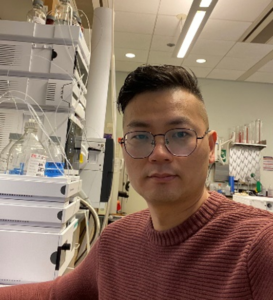
Acting Assistant Professor Wentao Zhu, PhD, is a member of the Northwest Metabolomics Research Center (NWMRC), directed by Dr. Daniel Raftery, at the Mitochondria and Metabolism Center (MMC) at the South Lake Union campus. Dr. Zhu is developing advanced metabolomics methodologies and building comprehensive databases to improve metabolite annotation. His research focuses on investigating metabolic changes that result from heart disease, cancer and other diseases and enhancing clinical diagnostic capabilities.
Dr. Zhu received his PhD from China Agriculture University and completed his postdoctoral fellowship and training at the University of Regensburg in Germany, where he received systematic training in metabolomics. Dr. Zhu spent 10 years as a faculty member at China Agriculture University in Beijing researching environmental toxicology and health.
Dr. Zhu recently completed an innovative project leveraging metabolomics techniques to define the metabolic response to synergistic drug interactions in cancer therapy. This research involved a detailed analysis of metabolic and lipidomic changes in MCF-7 breast cancer cells under stress conditions. By exposing the cells to low-glucose environments and inhibiting Stearoyl-CoA Desaturase 1 (SCD1) using a new drug candidate A939572, Dr. Zhu uncovered significant disruptions in cancer metabolic plasticity and growth. The study provided key insights into alterations in metabolic pathways and lipid profiles, offering valuable information for potential therapeutic strategies.
Currently, Dr. Zhu is conducting a comprehensive metabolomics investigation into the molecular mechanisms of a specific protein in a mouse model of heart failure. This project seeks to unravel the regulatory roles of the protein and its involvement in the pathological processes of cardiovascular diseases. Using state-of-the-art metabolomics approaches, Dr. Zhu aims to uncover critical mechanistic insights into the pathways affected by this protein and their implications for heart failure. The findings from this research have the potential to drive the development of novel therapeutic strategies for treating cardiovascular disorders.
Outside the laboratory, Dr. Zhu enjoys hiking, playing and watching soccer, and embracing the outdoors with his family whenever possible.
December 2024

Courtney Gomez, MD, Assistant Professor (as of January 2025), is currently exploring the relationship between anesthesia care during procurement of organs from brain-dead organ donors and clinical outcomes for organ recipients. Dr. Gomez’ research includes tracking the numbers of successful transplant procedures, discarded organs and organ rejections. Through this work she hopes to clarify best practices for anesthesiologists who care for the donors who give life to and improve outcomes for organ recipients. Dr. Gomez is working closely with a team in APM’s Neuroanesthesiology Division to elucidate evidence and best practices for traumatic brain injury anesthesia care. Her goal is to clarify anesthesia practices for neurologically injured patients and to honor brain-dead organ donors by providing the best evidence-based care possible.
Dr. Gomez attended graduated from The Medical College of Georgia and completed an internal medicine residency at Virginia Commonwealth University. After working for several years as a hospitalist, she and her husband moved to Seattle for his job in the tech industry. Dr. Gomez graduated from UW APM’s residency program in 2022 followed by a Neuroanesthesiology Faculty Fellowship in 2023. During her fellowship Dr. Gomez collaborated with researchers in exploring groundbreaking attempts to expand the boundaries of neurophysiology in microgravity. She credits the collaborative nature of the research team and her colleagues as major influences in her decision to stay at UW.
Dr. Gomez enjoys the team approach in the operating room environment and helping to develop APM residents and visiting students (student CRNAs, EMS practitioners, AirLift Northwest care providers) to be the strong, competent clinical providers that UW APM is known for producing. Also, getting to listen to great music while doing my job in the OR is a major bonus.
Dr. Gomez and her husband started their family in the Pacific Northwest and want to stay in the area. She loves Seattle summers including “the beautiful, sunny, mostly 70-degree weather that is a far cry from the humid, hot 90+ degree summers” she remembers from her childhood in the Southeast. Outside of work, Dr. Gomez enjoys “hearing AMAZING music at the Chateau St. Michelle summer concert series (John Legend, Indigo Girls, Wynona Judd this past year among others).” She also enjoys morning and evening walks in Judkins Park with her dog and seeing Mount Rainier illuminated by the rising or setting sun as a close second place no matter the time of year for awe-inspiring beauty.
November 2024

David Marcus, PhD, is a postdoctoral fellow in the Bruchas Lab whose research is focused on understanding the neural mechanisms of addiction. Disruptions in reward-seeking behaviors are central to substance use disorders and many psychiatric illnesses, but the neural mechanisms that regulate these behaviors remain obscure. Multiple sources of excitatory input to the Nucleus Accumbens, a key nodal structure in the neurocircuitry of addiction, have been demonstrated to play a role in driving reward seeking and consumption, yet how these varied sources of input are filtered at the neural level remains unresolved. The endogenous cannabinoid signaling system, the most widely expressed neuromodulatory system in the mammalian brain, has been shown to regulate excitatory input from many excitatory regions ex vivo. Using a suite of in vivo imaging and genetic manipulation techniques, Dr. Marcus uncovered an endogenous cannabinoid mechanism for regulation of engagement in reward-seeking behaviors through modulation of a genetically and anatomically defined thalamo-striatal circuit.
Dr. Marcus hopes to run his own independent research lab and will soon be applying for tenure-track positions.
In his free time, Dr. Marcus likes to climb, play guitar, play chess and spend as much time outdoors as possible.
October 2024

Gil Stamm, MD is an APM T32 Fellow and physician scientist working in Dr. James Carothers’ lab in the Department of Chemical Engineering. Dr. Stamm’s research focuses on synthesizing adenosine triphosphate using cell-free metabolic engineering. His goal is to use this energy to drive cell-free reactions to produce pharmaceuticals, nutrients, plastics and other useful chemicals. These reactions will reduce atmospheric carbon dioxide thereby helping environmental health and produce oxygen and thus support an atmosphere. This technology supports Dr. Stamm’s long term goals of making anesthesia more accessible, hospitals carbon neutral, and long-duration space travel medically possible. He decided to come to UW because of the University’s research excellence, focus on innovation, and cross-disciplinary nature.
Dr. Stamm’s interest in outer space stemmed from his visits to NASA’s Johnson Space Center as a child. He combined this interest with his passion for medicine and research. He attended the University of Notre Dame for his undergraduate studies, Indiana University School of Medicine for his M.D. and Georgetown University for his anesthesia residency.
In his spare time, Dr. Stamm enjoys exploring the Pacific Northwest and loves all its outdoor recreation. He has already visited all three national parks in the state of Washington and plans to discover more hiking, biking and running trails.
July/August 2024

Postdoctoral fellow Kasey Girven, PhD, is a budding neuroscience researcher and a passionate advocate and mentor for first-generation students considering careers in science and engineering.
Dr. Girven, a member of the Bruchas Lab and NAPE Center, is a recent recipient of a NIH/NINDS K99 award supporting investigation of neuropeptide S (NPS), a neuropeptide shown to increase drug-seeking behavior as well as inhibit stress-induced behaviors. The orbitofrontal cortex (OFC), a brain region linked to natural reward and drug-seeking behavior, receives input from hindbrain NPS neurons. Dr. Girven seeks to determine how NPS transmission in the OFC and downstream targets are recruited during repeat exposure to high value rewards. Data from the study may ultimately help identify potential novel treatment targets for treating opiate use disorder.
Dr. Girven selected UW for her postdoctoral studies because she wanted to learn from renowned neuroscience mentors Professors Michael Bruchas, PhD and Larry Zweifel, PhD, as well as work in the resource rich environment of the NAPE Center. She was also lured by the city of Seattle and the natural beauty of the Pacific Northwest. Discovering and connecting with the avid gaming community in Seattle was an unexpected bonus.
Dr. Girven’s long-term professional goal is to become an independent neuroscience investigator at an academic institution focusing on addiction neuroscience. In addition, Girven is committed to continuing to engage with students from underrepresented communities and to promoting diversity and racial equity in science and academia.
June 2024
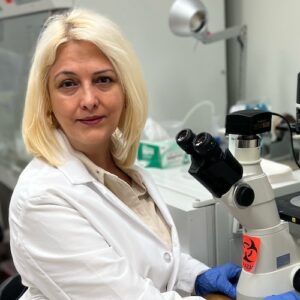
Acting Instructor Shabnam Salimi, MD is a translational physician-scientist in Dr. Daniel Raftery’s lab and a K01 award grantee from the National Institute on Aging. Her research focuses on biological aging as an underlying mechanism of chronic diseases, employing omics tools, cell cultures, and animal models to validate findings from human aging studies. Dr. Salimi works on the development of health algorithms across species to capture aging processes, including PathoClock, PathoAge, PhysioClock, and PhysioAge in rodent models, as well as the Human Health Octo Tool (HOT) to assess human health. She chose the University of Washington to further her research in aging using “omics” approaches and to benefit from the contributions to understanding mechanisms of aging achieved by the Nathan Shock Center of Excellence in the Basic Biology of Aging, the Northwest Metabolomics Research Center and the Mitochondria and Metabolism Center. Dr. Salimi aspires to make significant contributions to population health and health equity by translating scientific discoveries from the bench to real-world human health applications.
Dr. Salimi completed her postdoctoral fellowship and training at the University of Maryland and served as a Special Volunteer at the National Institute on Aging Intramural Research Program. She decided to move to Seattle after attending statistical genetics workshops at UW’s Summer Institute in Statistical Genetics.
Dr. Salimi appreciates the natural beauty of Washington State and spends her free time hiking, biking, writing modern poetry, and playing chess.
MAY 2024
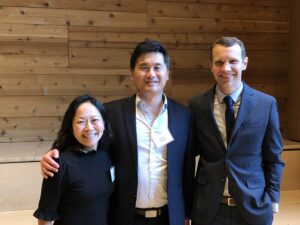
Academic Evening 2024
Event Co-Chairs Dustin Long and See Wan Tham, Vice Chair for Research Tonya Palermo and Department Chair Burkhard Mackensen, welcomed faculty, trainees and staff to APM’s 16th Academic Evening at UW’s Intellectual House on May 7th. The event featured 59 academic posters highlighting innovative research across the department, presentations by authors of award-nominated abstracts, and an inspirational keynote address by Patrick L. Purdon, PhD, Professor of Anesthesiology, Perioperative and Pain Medicine and Bioengineering at Stanford University School of Medicine.
APRIL 2024

Associate Professor Nita Khandelwal’s research program focuses on the intersection of palliative and end-of-life care, critical care, and health economics. She is particularly interested in the ability of supportive and palliative care interventions to improve patient and family outcomes, and thereby improve both the quality and value of care delivered to seriously ill patients. Dr. Khandelwal thinks addressing and mitigating financial hardship is a missing key component of interventions designed to improve patient- and family-centered outcomes after critical illness.
Dr. Khandelwal earned an undergraduate degree in the School of Foreign Service from Georgetown University in Washington, DC, followed by medical school at Loyola University Chicago, Stritch School of Medicine. She completed residency training at Northwestern University and then moved to UW APM for a critical care fellowship and to pursue a MS degree in Pharmacoeconomics through UW’s Comparative Health Outcomes, Policy and Economics Institute. The people and culture at Harborview and the robust critical care research environment, including an invaluable mentorship relationship with Dr. Randy Curtis, led to her decision to stay at UW.
A native of the western suburbs outside Chicago, Dr. Khandelwal never tires of the natural beauty of the PNW and the ease of access to so many recreational activities. In her free time, she loves to spend time with her kids, ages 7 and 9, and husband Matt. Their family loves traveling, skiing, and camping. Dr. Khandelwal also enjoys tennis, baking, and arts and crafts of all kinds.
March 2024
APM’s 2nd Annual Research Retreat brought 30 faculty members and 3 residents to UW’s Intellectual House under the theme “Collaboration and Team Science.” Vice Chair for Research, Dr. Tonya Palermo, welcomed attendees and outlined the retreat’s goals: evaluate progress, foster collaboration, exchange ideas, and identify research or resource gaps. Department Chair, Dr. Burkhard Mackensen, shared the state of the department’s research enterprise including research proposal and grant award trends and congratulated faculty for their recent professional achievements.
Attendees heard from keynote speaker Dr. Nino Ramirez, Director of the Center for Integrative Brain Research at the Seattle Children’s Research Institute, Zain Nadella Endowed Chair in Pediatric Neuroscience in the UW Department of Pediatrics, and Editor-in-Chief of Journal of Neurophysiology. Dr. Ramirez presented “Networks without borders: The dynamic control of breathing and other vital functions.”
The audience also heard from 4 department investigators presenting their work:
- Professor Nathalia Jimenez, MD, MPH, “Traumatic Brain Injury Among Latino Children”
- Associate Research Professor Nagana Gowda, PhD, “Unstable Coenzymes and their Anomalous Dynamics: New Insights from NMR Spectroscopy”
- Associate Professor Nita Khandelwal, MD, MS, “Financial Hardship After Critical Illness: Understanding the Burden and Consequences”
- Assistant Professor Rui Li, PhD, “Preventing Chronic Pain: Integrating Clinical and Population Health Approaches”
Opportunities for collaboration and team building were offered during breakout sessions led by APM faculty:
- “Translational/Technology-Based Research” co-chaired by Professor Vikas O’Reilly-Shah, MD, PhD and Associate Professor Jacob Sunshine, MD, MS
- “Mitochondria and Metabolism Center” chaired by Professor Rong Tian, MD, PhD“
- Center for Neurobiology, Addiction, Pain and Emotion” co-chaired by Professor Michael Bruchas, PhD and Professor Garret Stuber, PhD
- “Population & Global Health” chaired by Professor Nicholas Kassebaum, MD
- “Clinical Trials” co-chaired by Research Professor Kushang Patel, PhD, MPH, and Professor Brett Stacey, MD
We extend a special note of gratitude to the planning team for their time and organizing efforts, to the presenters for sharing their knowledge and insights, and to the attendees for their participation and constructive feedback. The past two retreats have helped us learn about faculty experiences, strengths, challenges, and areas of research needs in the department, which we will use to develop longer-term departmental goals for research.
February 2024

Rui Li, PhD is a pain epidemiologist and a newly appointed Research Assistant Professor in the Department of Anesthesiology and Pain Medicine. Dr. Li is currently building a research program that aims to integrate developmental considerations and sex and gender-specific factors to prevent the occurrence and reduce the public health impact of chronic pain. With a keen interest in addressing pain in women and children, her long-term goal is to prevent the development of chronic pain in young people and reduce sex and gender disparities in pain across the lifespan.
Dr. Li grew up in a small seaside town in Zhejiang Province, China. With a heart deeply rooted in her childhood experiences, where the hardship and strength of the women around her—especially her mother—left a lasting imprint, Dr. Li is always fascinated with understanding the struggles and resilience of females. As the first in her family to attend college, she completed a 5-year bachelor’s degree in preventive medicine from Shanghai Jiao Tong University School of Medicine and School of Public Health, where she gained broad exposure to basic science, clinical medicine, applied public health work, and research methodology. This has laid the groundwork for her long-term commitment to evidence-based prevention research. Dr. Li furthered her education with a PhD in epidemiology from the University of Rochester School of Medicine & Dentistry in Upstate New York, where she received in-depth training in population-based and clinical research methodology. Her dissertation work, motivated by the significant public health burden of chronic pain and its disproportionate impact on women, focused on the role of menstrual pain in the emergence and severity of chronic pain later in life. The goal was to highlight the significance of menstrual pain as a public health problem and to better manage menstrual pain as a strategy for preventing chronic pain in women.
To continue her research in chronic pain prevention, Dr. Li joined the Pediatric Pain and Sleep Innovations (PPSI) lab at Seattle Children’s Research Institute in 2021 as a postdoctoral fellow in pursuit of research in adolescent chronic pain. She has completed a small institution-funded project which examines the roles of pubertal development, sex hormones, and sleep circadian health in the onset of adolescent pain. Currently, she is expanding this line of research to include early life maternal and family risk factors, aiming to create early life, family-based prevention interventions and puberty-informed programs for preventing the incidence of chronic pain in adolescents.
Dr. Li is immensely grateful to all the mentorship received throughout her academic journey, including the invaluable guidance from her dissertation mentors, Drs. Christopher Seplaki and Donna Kreher, in addition to the generous mentorship support throughout her fellowship training from Drs. Tonya Palermo, Jennifer Rabbitts, See Wan Tham, Neels Groenewald, and Kushang Patel. As a new faculty member, Dr. Li is thrilled to work with the faculty and trainees in the Department of Anesthesiology and Pain Medicine to contribute to the mission, growth, and success of the department.
Outside her professional life, Dr. Li enjoys the serenity of nature, reading, hiking, and cooking. She cherishes time with her husband, cat, and family back in China. Dr. Li is particularly fond of the natural beauty around Seattle, making it a family tradition to visit Mount Rainier every summer. Her recent explorations of natural landscapes in both the US and Canada have brought her tranquility, freedom, and inspiration.
January 2024
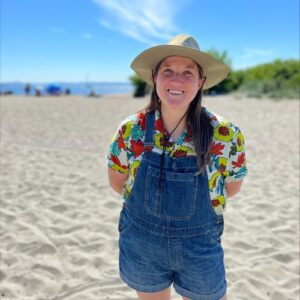
Paige M. Keasler, DO is an Acting Assistant Professor in the Department of Anesthesiology and Pain Medicine. She grew up in the suburbs of Chicago, raised by teacher parents who instilled in her their passion for education and helping others. Her mother, a PE teacher, and father, a collegiate basketball coach, exposed her to sports and she quickly learned the importance of teamwork and resiliency.
Dr. Keasler’s journey began as an undergraduate at Lake Forest College where she majored in Biology and Psychology. She received a scholarship to play collegiate basketball where she was an Academic All-American for 4 years. She played rugby in her off-season. At Lake Forest College, Dr. Keasler began research in Cell Biology and Anatomy. She received a research internship at Rosalind Franklin University-Chicago Medical School where she completed her thesis on single nucleotide polymorphisms within apolipoproteins and how they manifest in mild cognitive impairment versus Alzheimer’s disease.
Upon graduation, Dr. Keasler joined AmeriCorps in Seattle, where she put her academic research into clinical practice with patients experiencing neurodegenerative diseases such as Alzheimer’s, Huntington’s, and Parkinson’s. After AmeriCorps, Dr. Keasler went to medical school at Western University of Health Sciences in Oregon.
She completed an Anesthesiology residency back in the Midwest at the University of Iowa, where she was voted chief resident in her final year. She found a passion for women’s health and obstetric anesthesiology and met an important mentor who further exposed her to academic medicine. She completed an Obstetric Anesthesiology Fellowship at Washington University in St. Louis and accepted her current position at the University of Washington shortly after. While in fellowship, she performed a network meta-analysis investigating the treatment of acute onset severe hypertension in pregnancy. She also researched the possible use of Ketamine for postpartum depression prevention, in addition to opioid use after cesarean delivery, helping set up an opioid takeback program.
At this point, you may be thinking her research interests are broad, and you are right! She is currently the PI at the University of Washington for the BASIC trial with the goal of improving implementation of evidence-based approaches and surveillance to prevent bacterial transmission and infection.
She is on the editorial board for the International Journal of Obstetric Anesthesiology performing peer review and helping to manage their social media accounts. Dr. Keasler is currently the associate OB Anesthesiology Fellowship Director and a lead on the Fetal Surgery Team at UWMC-Montlake.
In her free time, Dr. Keasler still likes to play team sports, ride her bike (she recently completed a ride from Seattle to Vancouver, BC), hike in the fresh PNW air, and take her 2012 Red RAV4 (she calls it the Red Ravioli) on road trips. She has a goal to visit every National Park and has already visited 53/63!

